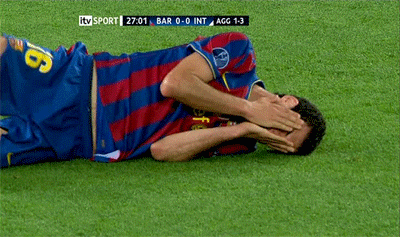By David Papineau
Mr. Papineau is the author of “Knowing the Score: How Sports Teach Us About Philosophy (and Philosophy About Sports).”
Sign up for the Opinion Today newsletter Get expert analysis of the news and a guide to the big ideas shaping the world every weekday morning. Get it sent to your inbox.
LONDON — It is a part of the viewing experience of World Cup football (soccer, as Americans know it). At the slightest physical contact with an opponent, a player throws himself to the ground and writhes around in mock agony, grabbing a body part (an ankle, a knee) that has been offended by an instance of pretend contact. All the while he is sneakily peeking at the referee to see if he has duped him into awarding a penalty, or even better into ejecting an opponent from the game.
To many Americans, the most risible feature of the World Cup was not the knockout-stage loss to the Dutch. It is this shameless playacting of the athletes.
Indeed, spectators new to football are likely to find these histrionics hard to stomach. Some of the top players, including Portugal’s Ronaldo and Uruguay’s Luis Suárez, have long had a reputation for theatrical flopping, hurling themselves headlong at the slightest bump in the hope of gaining a foul. Last week, at one point in the U.S.-Netherlands game, the Dutch player Denzel Dumfries spent fully 20 seconds writhing around on the ground in the U.S. penalty area, only to spring back to life and sprint back into the action once it was clear the officials hadn’t been fooled. More recently, a nastier dimension has been added, as players feign serious injury to add substance to their charades.
Have these world-beating athletes forgotten their dignity? Surely they can take no pride in such transparent acts of deception.
Advertisement
Continue reading the main story
But maybe this is just a parochial reaction to unfamiliar conduct. After all, people arrange their lives differently in different parts of the world. We should take care not to conflate the strange with the immoral.
Sports in particular provide ample demonstration that actions that are acceptable in one context can seem objectionable in another. American sports provide plenty of examples of accepted practices that strike foreigners as less than fully honorable. Basketball players happily commit blatant fouls to stop the clock. Football coaches call time out to “ice” the kicker (in theory, to put more pressure on the kicker’s field goal attempt). Hockey players are given five-minute penalties for fistfights that would get football players banned for a season.
Nor are American athletes above deceiving the officials. In baseball, young catchers are taught the art of what’s called “framing the pitch,” gathering the baseball into their gloves in ways designed to trick umpires into calling balls as strikes. Baseball fielders who have trapped a fly ball (as opposed to actually catching it) will leap up triumphantly, hoping to persuade the officials the catch was fairly made. To the billions of cricket fans around the world, this will appear particularly discreditable. Fielders in cricket who claim catches they know they haven’t made will be ostracized by their teammates, let alone by the opposing side.
Sports fans are quick to condemn the morals of other codes. But in truth much of this is simply misplaced insularity. In sports, as in wider society, many different conventions are consistent with the demands of morality.
In effect, the athletes in different sports have forged a variety of agreements about how to play their games, about what levels of physicality are to be expected, about whether to call fouls on themselves or leave it to the officials, about which ruses are acceptable and so on. Reneging on these shared commitments is always morally improper, as it is in other areas of life. Athletes who use tricks that they know their opponents will shun are simply trading on trust to take advantage.
But this leaves plenty of room about where exactly to draw the line of fair play. Baseball isn’t less moral than cricket just because it imposes different expectations on fielders who trap the ball. In the end, fans who dismiss sports just because they have variant codes are little different from people who look down on foreigners because they have different table manners.
Different conventions, in sports as in society in general, can be equally morally acceptable. But it doesn’t follow that there are no immoral conventions. “When in Rome, do as the Romans do” takes us only so far. After all, the Romans practiced slavery and crucified public enemies. Many modern societies still uphold immoral customs. Qatar outlaws homosexuality and lacks basic workers’ rights. These might be longstanding elements in the Qatari social structure, but that doesn’t make them right.
It’s the same in sports. Some practices are clearly beyond the moral pale. When in 2012 “Bountygate” exposed the N.F.L.’s New Orleans Saints for paying players bonuses for injuring opponents, they didn’t try to defend themselves on the ground that everybody was doing it. Deliberately trying to injure sporting opponents isn’t like framing a pitch. It isn’t something that might be incorporated into a healthy sporting practice, any more than slavery might be incorporated into a healthy civil society.
I feel the same about football players flopping to get their opponents into trouble. It’s not just the deception. It’s the meanspiritedness of trying to get someone punished for what he didn’t do. Players can become very skilled at duping the referee. But that’s not what we admire them for. Their tawdry playacting only demeans the transcendent athletic skills displayed by the top football players.

 www.nytimes.com
www.nytimes.com
Mr. Papineau is the author of “Knowing the Score: How Sports Teach Us About Philosophy (and Philosophy About Sports).”
Sign up for the Opinion Today newsletter Get expert analysis of the news and a guide to the big ideas shaping the world every weekday morning. Get it sent to your inbox.
LONDON — It is a part of the viewing experience of World Cup football (soccer, as Americans know it). At the slightest physical contact with an opponent, a player throws himself to the ground and writhes around in mock agony, grabbing a body part (an ankle, a knee) that has been offended by an instance of pretend contact. All the while he is sneakily peeking at the referee to see if he has duped him into awarding a penalty, or even better into ejecting an opponent from the game.
To many Americans, the most risible feature of the World Cup was not the knockout-stage loss to the Dutch. It is this shameless playacting of the athletes.
Indeed, spectators new to football are likely to find these histrionics hard to stomach. Some of the top players, including Portugal’s Ronaldo and Uruguay’s Luis Suárez, have long had a reputation for theatrical flopping, hurling themselves headlong at the slightest bump in the hope of gaining a foul. Last week, at one point in the U.S.-Netherlands game, the Dutch player Denzel Dumfries spent fully 20 seconds writhing around on the ground in the U.S. penalty area, only to spring back to life and sprint back into the action once it was clear the officials hadn’t been fooled. More recently, a nastier dimension has been added, as players feign serious injury to add substance to their charades.
Have these world-beating athletes forgotten their dignity? Surely they can take no pride in such transparent acts of deception.
Advertisement
Continue reading the main story
But maybe this is just a parochial reaction to unfamiliar conduct. After all, people arrange their lives differently in different parts of the world. We should take care not to conflate the strange with the immoral.
Sports in particular provide ample demonstration that actions that are acceptable in one context can seem objectionable in another. American sports provide plenty of examples of accepted practices that strike foreigners as less than fully honorable. Basketball players happily commit blatant fouls to stop the clock. Football coaches call time out to “ice” the kicker (in theory, to put more pressure on the kicker’s field goal attempt). Hockey players are given five-minute penalties for fistfights that would get football players banned for a season.
Nor are American athletes above deceiving the officials. In baseball, young catchers are taught the art of what’s called “framing the pitch,” gathering the baseball into their gloves in ways designed to trick umpires into calling balls as strikes. Baseball fielders who have trapped a fly ball (as opposed to actually catching it) will leap up triumphantly, hoping to persuade the officials the catch was fairly made. To the billions of cricket fans around the world, this will appear particularly discreditable. Fielders in cricket who claim catches they know they haven’t made will be ostracized by their teammates, let alone by the opposing side.
Sports fans are quick to condemn the morals of other codes. But in truth much of this is simply misplaced insularity. In sports, as in wider society, many different conventions are consistent with the demands of morality.
In effect, the athletes in different sports have forged a variety of agreements about how to play their games, about what levels of physicality are to be expected, about whether to call fouls on themselves or leave it to the officials, about which ruses are acceptable and so on. Reneging on these shared commitments is always morally improper, as it is in other areas of life. Athletes who use tricks that they know their opponents will shun are simply trading on trust to take advantage.
But this leaves plenty of room about where exactly to draw the line of fair play. Baseball isn’t less moral than cricket just because it imposes different expectations on fielders who trap the ball. In the end, fans who dismiss sports just because they have variant codes are little different from people who look down on foreigners because they have different table manners.
Different conventions, in sports as in society in general, can be equally morally acceptable. But it doesn’t follow that there are no immoral conventions. “When in Rome, do as the Romans do” takes us only so far. After all, the Romans practiced slavery and crucified public enemies. Many modern societies still uphold immoral customs. Qatar outlaws homosexuality and lacks basic workers’ rights. These might be longstanding elements in the Qatari social structure, but that doesn’t make them right.
It’s the same in sports. Some practices are clearly beyond the moral pale. When in 2012 “Bountygate” exposed the N.F.L.’s New Orleans Saints for paying players bonuses for injuring opponents, they didn’t try to defend themselves on the ground that everybody was doing it. Deliberately trying to injure sporting opponents isn’t like framing a pitch. It isn’t something that might be incorporated into a healthy sporting practice, any more than slavery might be incorporated into a healthy civil society.
I feel the same about football players flopping to get their opponents into trouble. It’s not just the deception. It’s the meanspiritedness of trying to get someone punished for what he didn’t do. Players can become very skilled at duping the referee. But that’s not what we admire them for. Their tawdry playacting only demeans the transcendent athletic skills displayed by the top football players.

Opinion | Yes, the Players in the World Cup Do Keep Falling Over for No Reason
Different conventions in different sports can be equally morally acceptable.



